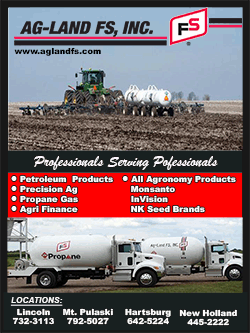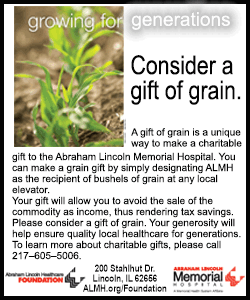|
 According to GrainHedge.com, producers today can
earn an additional 10 to 20 cents per bushel on the cash market by
selling direct. But, (yes there is always a but) success is going to
depend on the producers ability to understand the market, search out
the best buyers, raise an above standard crop, and maintain that
crop once it is in the grain bin. According to GrainHedge.com, producers today can
earn an additional 10 to 20 cents per bushel on the cash market by
selling direct. But, (yes there is always a but) success is going to
depend on the producers ability to understand the market, search out
the best buyers, raise an above standard crop, and maintain that
crop once it is in the grain bin.
A producer takes on the role of seller when he or she begins
reaching out to potential buyers.
As a direct seller, the producer should take responsibility for
having grain graded and the grade documented by a testing firm that
is trustworthy.
If the producer stores grain on the farm, then the additional role
of warehouseman is added to the mix. As the warehouseman, he or she
is responsible for maintaining the quality of the product as it is
reported on the grain test. This is important because if the grain
is graded and stored prior to the sale, and in the period of time
between filling the bin and emptying it the grain loses condition,
the seller is still responsible for delivering the product sold at
the grade promised.

All farmers strive to maintain the quality of grain in the bin, but
face it, freaky things can happen that could impact the quality of
the product. If it does and the grain is under contract, the farmer
may have to figure out how to come up with the product he or she
promised at the quality promised.
If the producer stores grain at an elevator, then the role of
warehouseman is passed on to the elevator, and along with it, the
burden of maintaining the grade or quality of the product.
Though today’s producers are much more highly educated as well as
tech savvy over the previous generations, the odds are that he or
she is not qualified to act as a licensed agent or broker, so
finding a reliable broker to assist with the process will be a key
component to direct selling.
WiseGeek.com offers the following description of a grain broker:
To become a grain broker, it is
usually necessary to have a bachelor's degree in a field related to
finance or agriculture. Some have degrees in public relations and
communications, because communication is key to being an effective
broker. Brokers can work for a brokerage under more experienced
brokers or they may operate independently. On a local level, a
single broker may be able to handle the day's business, while
brokers who work with commodity exchanges usually need the support
of a large office with numerous personnel.
The grain broker typically takes brokerage fees for every deal
arranged. These may include flat fees per unit of grain in addition
to percentage fees based on the amount of the deal. The broker
discloses these fees up front so that buyers and sellers can decide
whether or not the fees are acceptable. Brokers who charge high fees
may also offer special services as an incentive for people who might
otherwise turn down a relationship with the broker on the basis of
cost.

Working as a grain broker requires a knowledge of the commodities
market as well as the ability to predict, at least to some extent,
market movements. A broker who does not think ahead can end up with
unsatisfied clients such as buyers who pay too much for a grain
which falls out of favor or is produced in surplus or sellers who
are angry that their grain sold at a price lower than it deserved.
However, even with the best skills and years of experience, a grain
broker ultimately cannot make predictions about market movements
with confidence. A simple Google search
using the words “grain broker” will bring up dozens if not hundreds
of people and firms throughout the country who are anxious to
represent direct sellers. The level of involvement varies, so the
most important part of finding a broker will be to talk to and
understand the broker commitment and determine if the seller and
broker are ‘on the same page’ when it comes to moving grain to an
end-user.
Here are a few examples of people and firms found on the internet,
none of which are being endorsed or recommended by Lincoln Daily
News.
Grain Hedge is a trading assistance company physically
located in Bozeman, Montana with a large internet presence. The
company has several online tools including the ability to search for
buyers locally, within a 200 mile range of Logan County. The firm
boasts online trading and selling abilities 24/7 and claims they can
connect direct sellers to buyers from “elevators, ethanol producers,
crushing plants, mills, feed operations, and other high-volume grain
buyers.”
The company also offers a personalized broker and say sellers can
contact their brokers via phone or email. The list of benefits to
the client/seller include: Personalized Broker, Direct Market
Access, Trade Anytime, Anywhere, Hedging Made Convenient, Daily
Market Commentary.
Grain Hedge website:
http://grainhedge.com/GrainMarketing.aspx
[to top of second column] |

FarmLead offers the following mission
statement: “FarmLead aims to facilitate greater equality, efficiency
and transparency in grain marketing. Our online grain marketplace
allows farmers to find more buyers and identify the best possible
deal, while grain buyers easily access and identify the grain for
sale in their desired location.”
The firm does not physically handle the grain product. It offers a
connection between sellers and buyers and also tools to assist the
seller in making marketing choices. This firm offers a list of
qualified grain testing labs that can grade product and provide the
appropriate documentation.
The firm also offers a daily blog “Breakfast Briefs” (
https://farmlead.com /blog/breakfast-brief/ ) written by
president and CEO Brennan Turner. Turner himself is a former
professional Hockey player, turned Wall Street Commodity analyst
turned entrepreneur. The company is physically located in Canada.
The company offers its clients the following: Online physical cash
grain marketplace where it’s free to post, and fees are a fraction
of the cost of a brokerage - around the clock grain listing and
negotiations available for buyers and sellers - transparent,
quarterly credit verification of all buyers on the platform -
increased market reach across North America bringing more buyers and
sellers to the table; all for less time in the office and more money
in the farmer’s pocket. Fees charged for these services are based on
total grain sold in a trade.
FarmLead website:
https://farmlead.com/about/
Grainster is another web based brokerage program that offers
sellers direct access to buyers all across the county and
internationally as well. The company was the subject of an article
by Chris Bennett in AgWeb, an online magazine published by Farm
Journal.
Bennett referred to the business as “a dating service for grain.”

His article goes on to say: “Grainster does no trading, but rather
connects farmers with the people that will trade grain. The system
is relatively simple: A farmer goes on Grainster and lists the
amount of soybeans, corn, wheat, or rice that he wants to sell and
includes a phone number and email. The buyer – who may be local or
otherwise – contacts the farmer and negotiates a deal.
The company charges an annual fee to the seller, who then had
unlimited access to the Grainster selling tools and can post product
for sale as often as he or she wishes.
Grainster is owned by Layne Fortemberry, who serves as Chairman of
the Board and CEO of the company with wife Crissy Fortenberry being
his Vice Chairman. The company is physically located in Arkansas.
Grainster website:
http://www.grainster.com/ecosphere/
Looking at what is available online, sellers should ask themselves
if they are first, ready for a “long distance relationship?” Logan
County is a strong farming community with many top notch grain
handlers within driving distance of any farm. The local elevators
are staffed with people sellers can deal with one-on-one
face-to-face. That in itself can be a big benefit.
The producer should also ask him or herself if they want to take on
the extra concern of being a seller and/or warehouseman. How many
sleepless nights are they willing to put up with for 10 to 20 cents
per bushel? Are they savvy enough to deal with direct selling or
would they be better off to let someone else do the strategizing…and
the worrying?
And finally are they big enough to get into direct sales. Buyers
will more than likely be looking for high volume deals, and price
negotiations may be built around just how many bushels the seller
has to offer. Big contracts should earn better offers than smaller
ones.

So the best advice to come out of this may be to shop around, be
cautious, and confident in yourself as a marketing person before you
jump into an online matching service. Sometimes, what you have in
your own backyard is as good as it gets!
[Nila Smith]
|